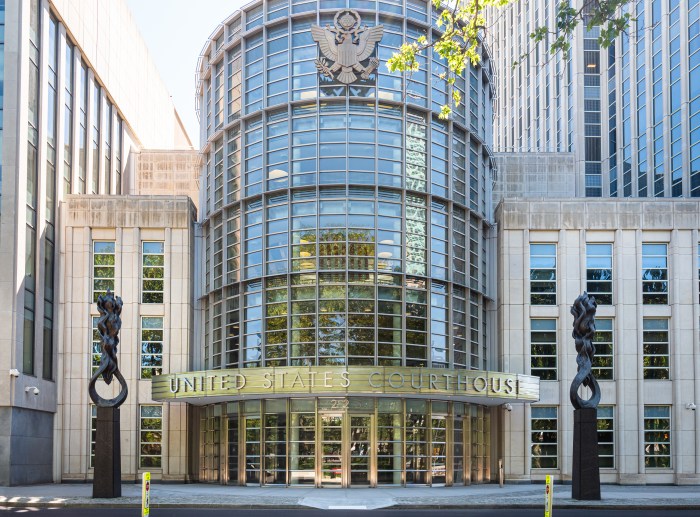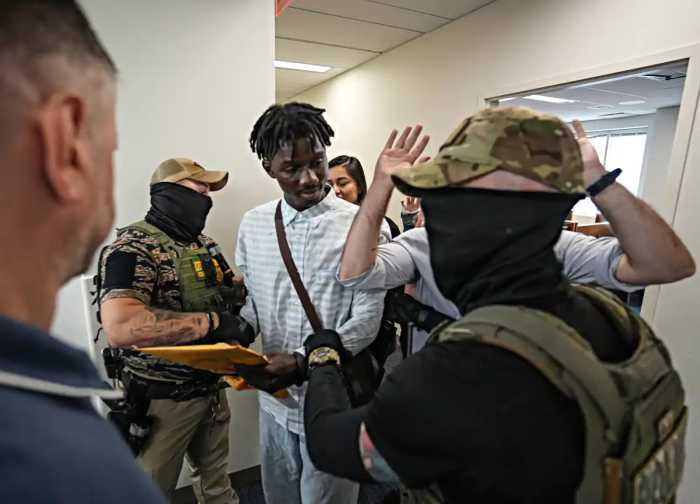Barrett Brown, the American journalist who has been jailed in Texas since September 2012, now faces a maximum prison sentence of 8 1/2 years after reaching a plea agreement last month with federal prosecutors in Dallas, according to newly unsealed court documents.
Brown’s plea agreement, dated March 27, and several other court documents, were ordered unsealed on Wednesday by United States District Court Judge Sam Lindsay. The court also lifted a government-proposed gag order that had been in place since last September, preventing Brown and his attorneys from speaking to the media about the case.
Altogether, the now publicly available documents shed additional light on Brown’s case and the alleged crimes he has admitted to.
Brown, a prolific journalist who focused his reporting on private government defense contractors who primarily work in the shadows, pleaded guilty to Internet threats (directed at an FBI agent), accessory after the fact in the unauthorized access to a protected computer, and interfering with the execution of a search warrant.
As part of the plea agreement, Brown also faces a potential fine up to $475,000, a term of supervised release no greater than three years, on top of any prison time he may serve, and restitution, if mandated by the court. His supporters have said that any prison sentence imposed by the court is expected to be far less than the possible maximum sentence.
Statutorily, Barrett Brown faces a maximum sentence of 102 months imprisonment (8.5 years) but will likely serve considerably less.
— Free Barrett Brown (@FreeBarrett_) April 23, 2014
Brown and his attorneys agreed to the plea deal three weeks after prosecutors dropped several counts against him, including the most controversial charge he was accused of: sharing a link of already publicly available information which prosecutors said contained hacked documents, along with 5,000-plus stolen credit card account numbers from Stratfor, a Texas-based global intelligence firm. Brown was never accused of the hack.
The dropped charges reduced his potential sentence from upwards of 100 years to about 65—which has now been reduced dramatically due to the plea deal.
The initial charges stemmed from the hack of Stratfor in December 2011, which resulted in a digital heist that netted about 860,000 records—including usernames, encrypted passwords, email addresses—belonging to the firm’s clients, according to court documents.
The hacked emails revealed a close relationship with government agencies.
It was a link from the Stratfor hack that prosecutors originally said Brown shared (copied and pasted) from one Internet Relay Chat (IRC) to another he ran through his own website, Project PM.
Related – Barrett Brown: American Journalist, Whistleblower & Prisoner
According to a factual resume also unsealed on Wednesday, in December 2011, a “person known to Brown…knowingly and intentionally accessed the computer network of Strategic Forecasting (Stratfor) without authorization.”
The documents also state Brown was aware that hackers defaced Stratfor’s website; that files were deleted from the firm’s server; and data was exfiltrated from its network. Brown also offered to communicate with Stratfor’s CEO regarding any redactions, the documents state.
By pleading guilty to the count related to interfering with the executive of a search warrant, Brown, according to court documents, admitted that he and his mother allegedly concealed two laptops containing his journalistic work and related source material after FBI agents arrived at his mother’s house on March 6, 2012 after raiding his unoccupied apartment. They also allegedly set up another laptop on a table to act as a decoy device, the documents state.
The government writes in its factual resume, which is initialed by Brown himself, that he and his mother “knew that it was unlawful to conceal the laptops. By concealing the laptops, Brown acted knowingly and willfully.”
Prosecutors add: by hiding the laptops they “intended to impede, obstruct, and influence the FBI investigation and the executive of the second Search Warrant issued by a United States Magistrate Judge.”
Additionally, Brown, who was outraged that the government seized his laptops without arresting him, admitted to threatening an FBI agent in part three of a series of now-infamous YouTube rants that have collectively been viewed by hundreds of thousands.
Brown called FBI Special Agent Robert Smith a “chicken shit little faggot cock sucker,” and allegedly threatened to “look into his fucking kids.”
In a previous interview, Brown’s childhood friend Caleb Pritchard described Brown’s outburst as a “slow burn” over several months.
“It finally got to the point where Barrett just snapped,” Pritchard said, “but I think at first he was just trying to figure out what the fuck was going on.”
Brown’s case has caught the attention of several civil liberty groups who have criticized the government for prosecuting a journalist for sharing a link.
The nonprofit Reporters Without Borders, which annually publishes a report dubbed the “Press Freedom Index,” earlier this year dropped the United States in its rankings for 2013, from 32 to 46, partly due to Brown’s prosecution, and its so-called war on whistleblowers.

































